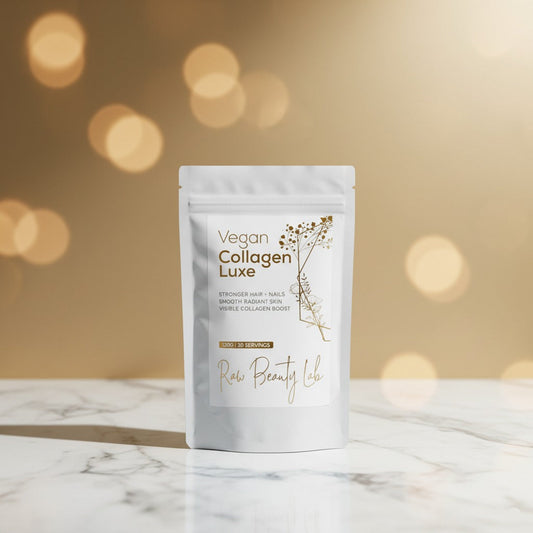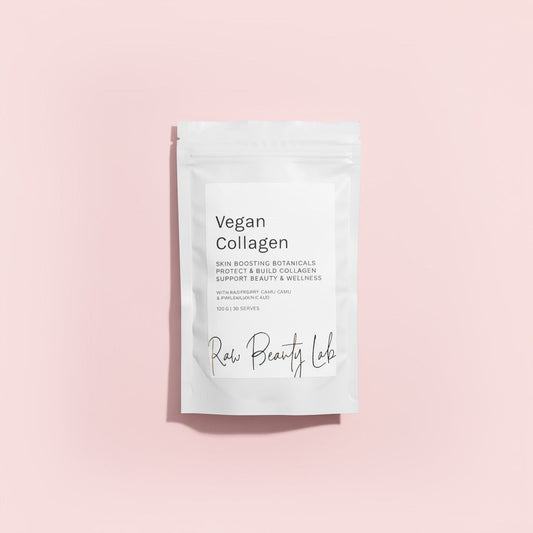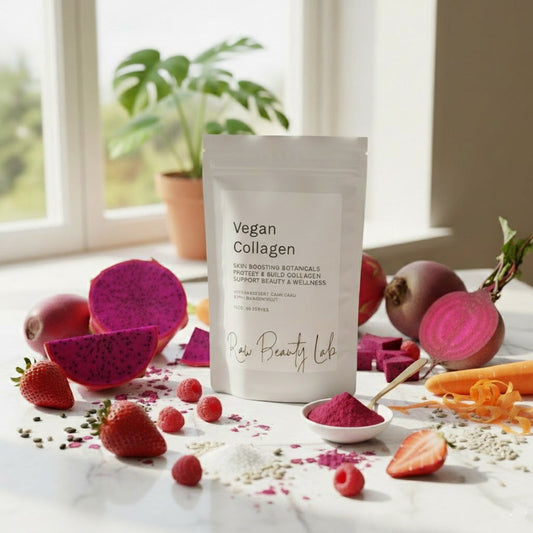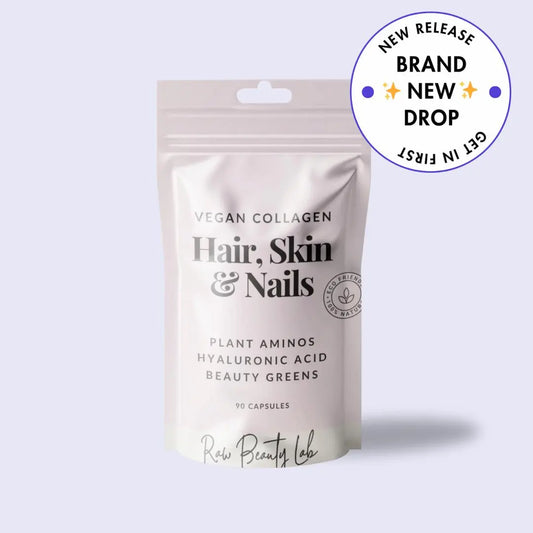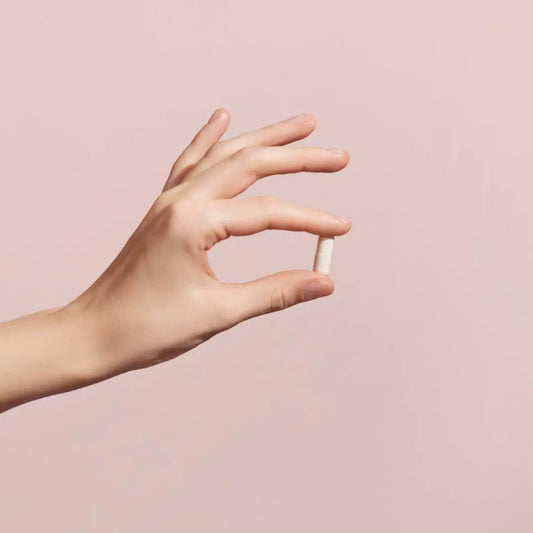Table of contents
With collagen trending in the beauty, wellness and supplement industries, it can be overwhelming to decide which collagen supplement might work best for you. We have an entire article that takes you through the differences between the major types of collagen and what they can be used for so you can make the best decision. You can read about that here.
However, an important question you should be asking is: what else has sneaked its way into your collagen supplement and should it even be there? The ingredient list of a supplement, (or a moisturiser or a can of soup for that matter), should be the first thing you look at before deciding to purchase a product!
Collagen, especially animal collagen, is usually derived from essentially inedible animal parts like fish skin and cow bones. Masking the taste of these constituents becomes a priority. and you can only image how much soy sauce or siracha you’d need to drown a raw cow bone in before it becomes edible!
But let’s be honest, who has the time these days to analyse an entire list of 17-syallabed chemicals to know what is and isn’t good for you? Lucky for you I have broken down our no-no ingredients into 4 categories and highlighted the different names they masquerade under to go unnoticed in a collagen supplement.
1. Artificial Sweetners
We want to consume products that taste good. However, have you ever thought why your cookies and cream collagen bar tastes so good before devouring it? While a lot of companies are moving away from using refined sugar in their products (thank God!), the presence of artificial sweeteners is becoming much more prevalent. The fact that they are low or zero calorie make them all the more appealing for health fanatics as they provide a short-term benefit for weight management.
Although the FDA does consider artificial sweeteners safe when ingested in moderation, their benefits upon long term ingestion remain questionable. Firstly, other than reducing calorie intake, they provide no nutritional benefit. Although studies for most artificial sweeteners have resulted in them being considered safe, the dietary recommendation for what is considered ‘safe’ remains inconclusive.
Additionally, some studies have found that despite being low calorie, they may cause weight gain. It is theorised that because they taste sweet but lack the calories, this confuses the brain and prevents the food-reward pathway being activated – causing you to continue eating and consequently gain weight. Although I should note here that other studies have shown that artificial sweeteners do have the ability to reduce total body weight and BMI – so their effects on body weight remain largely inconclusive.
The more definite effects of artificial sweeteners were actually shown to be on gut bacteria. Gut bacteria is responsible for everything from sugar control to your immune system to how well you sleep (so they’re pretty important). However, gut flora was found to be disrupted after consumption of the artificial sweetener saccharin and these candidates also exhibited poorer blood sugar control just 5 days after consuming the sweetener. When the gut microbes from these candidates was administered into healthy mice, they also were unable to properly control their blood sugar.
While more research needs to be done to have a more definite conclusion, it is important to consider the aftermath of artificial sweeteners, especially if you are consuming them on a daily basis.
2. Fillers and Shelf-Life Extenders
Highly perishable goods are not as useful to companies as it means they can't mass produce them and therefore can’t produce them cheaply. Additionally, the active ingredient for a supplement may actually be very little – which to untrained eyes (like ours), would look like a waste of money as we are probably physically consuming about a tablespoon’s worth of product (if you’re stretching it). Adding fillers can help bulk up the overall volume so that it ‘looks’ like we are having a lot more of the active ingredient when in reality we aren’t.
But why should you avoid these additives? Because they have a proven track record of being, well – not very amicable to your gut. Carrageenan for example is a relatively common filler and shelf-life extender that can be found in foods still labelled as ‘natural’. While it is sourced from seaweed (and therefore technically natural) it has been found in numerous studies to cause bloating to more severe cases of inflammatory conditions such as arthritis, ulcerative colitis and irritable bowel syndrome. While the studies on carrageenan are limited, there have been many self-reported cases amongst humans to raise concern. There are even petitions going round to make carrageenan more visible on food labels and have these labels marked with a warning. While it is still approved for use by the FDA, it is no longer labelled organic.
Take a look at the table below for some other common fillers and shelf life extenders you'll want to avoid.
3. Synthetic Ingredients
Although a lot of ingredients can fall under this category, I want to pull you attention mainly towards synthetic vitamins. Although they are chemically identical to natural vitamins, synthetic vitamins are not absorbed as effectively and also don’t work as effectively in the body. For example, natural vitamin E is twice as effective as an antioxidant than its synthetic twin because the body recognises the shape of natural vitamin E much better than its synthetic counterpart.
Additionally, natural vitamins from wholefoods are also much more effective in your body because they are usually absorbed with other vitamins and minerals present in the wholefood as well. For example, vitamin C in wholefoods like broccoli and red bell peppers is better absorbed and much more effective in its collagen building abilities because of the presence of bioflavonoids in these wholefoods – which synthetic vitamin C would lack.
If you are ever unsure about where a company sources it products from, go straight to the source and reach out to the company as they would know exactly what they put in it!
4. Natural Flavours
A trickier one than synthetic vitamins, natural flavours is a pretty vague term – and what makes it worse is that it's defined differently by different regulatory bodies! A flavour being labelled as natural as opposed to artificial means that it is sourced from either plants or animals, but it will still have a partly chemical make-up. What makes things even worse, is that genetically modified animal or plant sources (contaminated with all sorts of pesticides) can still be classified as a 'natural' flavour.
The FDA does not clearly define what would pass as a natural flavour so it can be largely used as a marketing buzz word which has been scientifically proven to make the product seem ‘healthier’ to consumers.
The UK flavour association have indicated that anything passing as a natural flavouring must have 95% of the flavour coming from a natural source (e.g., lemons) – what constitutes the remaining 5%, although still regulated, largely remains disclosed.
Additionally, the use of natural flavourings is common practice for highly processed foods, which, compared to supplements, are thought (and hoped) to be ingested not so frequently. Supplements are designed for daily consumption. So, when natural flavourings (the constituents of which are still not completely transparent) are added to animal-based supplements, they would need to be present (as you can imagine) in relatively large amounts to mask the taste of these animal derived ingredients.
The consumption of natural flavours on a daily basis in these volumes have not been extensively tested to determine their safety for daily use – and could potentially be harming your health instead of helping it.
How To Choose Supplements Without Toxic Ingredients
Read and (Try To) Understand Ingredient Lists
Just a quick glance at an ingredients list can flag up any suspicious ingredients - usually because you can't pronounce them or you don't know what their function is. Use the rule of 3 and establish that if there are more than 3 ingredients that I don't understand, I am not going to purchase the supplement.
Opt For Supplements With Shorter Ingredient Lists
If trying to understand ingredients lists sounds like too much work, just stick to this simple rule: if the ingredients list is short, it's probably a good product. While this is not always the case, most of the time, a shorter ingredients list means there is less 'crap' in the product that doesn't actually need to be there and so you're probably avoiding most of the additives in it.
Consider the Price of the Supplement
If a supplement is unusually cheap, this might be a sign that it is full of additives. A big reason why additives are used is because it makes supplements much easier to produce and store. Shelf life extenders help increase the longevity of the product and make storing them easy and inexpensive for suppliers. Filler additives are also cheaper than the actual active ingredient so you may think you are getting more product when in reality you're just paying for fillers to bulk the product up.
Buy Non-GMO, Organic and Vegan if You Can
The certification behind these words essentially increases the number of regulatory bodies the product has been through before being crowned these titles. Of course there are still products that are labelled organic or vegan and are still full of additives - hence I suggest their combination.
And if You're Still in Doubt, Just Ask!
Be it directly to the company, online forums or that one label loving fitness crazy friend (guilty as charged!), there are many different sources of information that are more than willing to help people understand how food additives work and how they could harm you. With more and more people becoming aware about the harmful aftermath of ingesting food additives, I'm sure you'll get the answers to your questions!
I hope that I have given you a little more insight into the pitfalls of additives. While I don’t think its necessary to completely boycott them all, I do believe it is important to ensure that you are reading more labels so you are at least aware of what you are puting into your body.
While it may seem almost impossible to find a supplement that is free of these additives, be rest assured that some companies are making more of an effort to only include pure natural wholefoods into their supplements.
Needless to say, here that at Raw Beauty Lab, we make every effort to ensure our vegan collagen supplement is free of any fillers, thickeners, sugars, sweeteners (both artificial and natural), flavours or preservatives. We also do our best to make our supply chain as transparent as possible so you know where we are sourcing our ingredients from (check out our ingredients list to find out more about where we source our ingredients from).
We believe you deserve nothing but the best for you and your health and we have a little motto that our founder Sonia established – if she wouldn’t give this supplement to her own mum, she wouldn’t give it to any of you!
Share your thoughts on the additives used in supplements in the comments below – it would be great to hear what you think!


